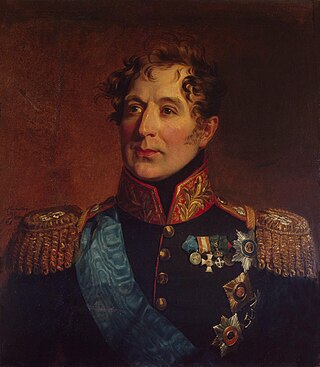
Count Mikhail Andreyevich Miloradovich, spelled Miloradovitch in contemporary English sources, was a Russian general prominent during the Napoleonic Wars, who, on his father side, descended from Serbian noble family and the katun clan of Miloradović from Hum, in present-day Bosnia and Herzegovina. He entered military service on the eve of the Russo-Swedish War of 1788–1790 and his career advanced rapidly during the reign (1796-1801) of Emperor Paul I. He served under Alexander Suvorov during Italian and Swiss campaigns of 1799.

Peter Tekeli (1720–1792) was a Russian general-in-chief of Serb origin. He achieved the highest rank among the Serbs who served in the Imperial Russian Army. He was born in a noble family of military tradition, whose men were officers of the Austrian army in the Military Frontier. Prior to his emigration to Russia in 1748, he fought as a young officer in the War of the Austrian Succession. Characterized by both courage and military cunning, he made a splendid career in Russia. He participated in the Seven Years' War, the first Russo-Turkish War (1768–1774), and the second Russo-Turkish War (1787–1792). Under his command, Zaporozhian Cossacks were disbanded and subjugated to the Imperial authority in 1775, without spilling a single drop of blood, for which he received the Order of St. Alexander Nevsky from Empress Catherine the Great. He retired in 1790, and died two years later in his mansion at Novomirgorod.

Marko Ivanovich Voinovich was an Admiral of the Russian Imperial Navy, one of the founders of the Black Sea Fleet.

Jovan Šević or Ivan Šević was an 18th-century military officer of Serb origin. He reached the rank of lieutenant colonel in the Serb militia forces in the Pomorišje region, then in the Military Frontier of the Habsburg monarchy. When it became obvious that privileges granted to Serb militiamen would be reduced or completely revoked after Pomorišje and Potisje lost their frontier status, Šević left Habsburg military service in 1750 and moved to Russia. At the end of 1752, he led the second wave of colonists who migrated from Pomorišje, Potisje and Slavonia to the Russian Empire where they settled the newly established administrative region of Slavo-Serbia at the beginning of 1753. To enable him to recruit more of his fellow officers, Šević was promoted to the rank of General by the Russian Empress, Elizabeth. He commanded a Serb Hussar Regiment consisting of the colonists he brought to Russia. After Šević's death, Slavo-Serbia was disestablished, and many of his descendants became notable military officers in the Russian Imperial Army. Over time, all the Serb colonists became assimilated. Miloš Crnjanski described the migration led by Šević in his most notable work, the novel Migrations.

There is a community of Serbs in Russia, also known as Russian Serbs, which includes Russian citizens of ethnic Serb descent or Serbian-born people residing in the country.
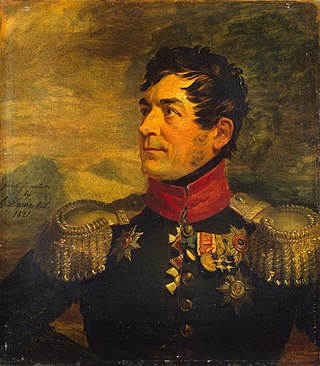
Count Georgi Arsenyevich Emmanuel was a Russian general of Serbian origin who participated in the Napoleonic Wars.
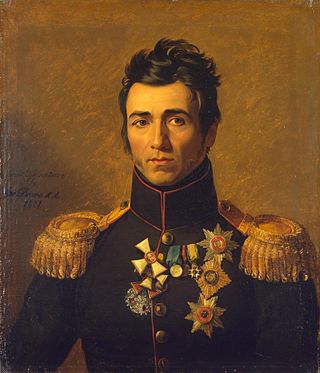
Peter Mikhailovich Kaptzevich or Kapcević or Kapzewitch was a General who led a Russian infantry corps during the 1814 Campaign in France. In 1812 he led the 7th Division at Smolensk, Borodino, Maloyaroslavets and Krasnoi. Promoted to command the 10th Infantry Corps, he fought at the Katzbach and Leipzig in 1813 and Vauchamps, Gué-à-Tresmes, Laon and Paris in 1814. He was governor of Western Siberia in 1822–1827 and the following year he led a corps of Siberian militia. He is buried at the church in Nikolskoye, Sakmarsky District, Orenburg Oblast.
Simeon Piščević was a Serbian memoirist and imperial Russian general.
Ivan Lukačević, known as Podgoričanin (Подгоричанин), was a Russian Imperial captain of Serb origin from Podgorica that participated in planning of a Balkan Orthodox uprising with Russian aid against the Ottoman Empire. He was sent with Russian colonel of Serb origin, Mikhail Miloradovich, to deliver documents issued by emperor Peter the Great on 3 March 1711 that called the Balkan Orthodox to rise up against the Ottomans during the Pruth River Campaign. Miloradović and Lukačević arrived at Cetinje and delivered them to metropolitan Danilo, who had them read at a Montenegrin church assembly. This was the first Russian delegation to Montenegro. Danilo, Miloradović and Lukačević then organized military operations. In September 1712, Lukačević left Montenegro and headed for Russia. However, he was left in Berlin.
Jovan Samuilović Horvat de Kurtič, also referred to as Ivan Horvat, was a Russian general of Serbian origin who founded New Serbia in the modern Kirovohrad Oblast.
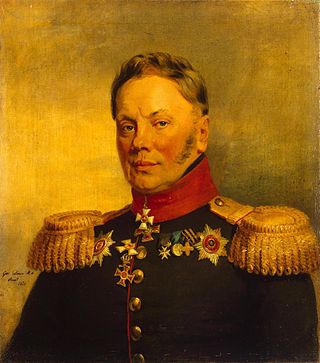
Baron Ilya Mikhailovich Duka was a Russian general in the Napoleonic Wars.
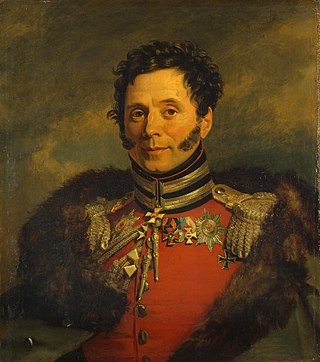
Nikolai Ivanovich Depreradovich was one of the most decorated Russian generals who fought against Napoleonic France. He was a general of the cavalry and adjutant general who took part both in Napoleonic Wars and Finnish Wars. His family, with roots in Serbian lands, moved to Imperial Russia in 1752.
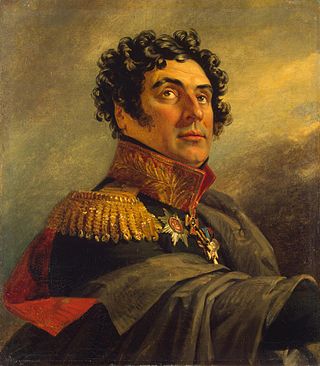
Count Peter Ivanovich Ivelich or Peter Ivelich IV was a Serb Montenegrin who ranks among the most important Russian generals who fought during the Napoleonic invasion of Russia. His portrait was added to the Military Gallery of the Winter Palace along with other participants in the Patriotic War of 1812. His uncles are count Marko Ivelich, major-general Ivan Konstantinovich Ivelich and colonel Simeon Konstantinovich Ivelich.

Count Marko Konstantinovich Ivelić (1740–1825) was a Serbian born Russian general from Risan who rose to prominence in Russian military service during the reign of Emperor Nicholas I of Russia and Prince-Bishop Petar I Petrović-Njegoš of Montenegro. He became a Russian general and count. In 1811 he was a diplomatic emissary to Revolutionary Serbia.

Ivan Egorovich (Georgievich) Shevich was a Russian-born Serb nobleman who was one of the leading fighting-generals, and one of the bravest, in the Russian Imperial army under the command of Mikhail Kutuzov and Emperor Alexander I in the war against Napoleonic France. His grandfather, Lieutenant-General Jovan Šević, led Serb colonists from the Habsburg Monarchy to Imperial Russia during the reign of Empress Elizabeth Petrovna. Ivan's victory against Napoleon at the Battle of Borodino in 1813 puts him in the first rank of Russian military heroes. Today his portrait hangs with other generals in the Military Gallery of the 1812 State Hermitage at St. Petersburg.
Ivan Stepanovich Adamovich was a highly-decorated Russian general who fought at the Battle of Borodino, commanding the 1st Corps of the Reserve Army.
Avram Petrovich Ratkov was a Russian general of Serbian descent who participated in many battles, including the Battle of Borodino where he commanded the reserve military force with the rank of major general.

Andrei Stepanovich Miloradovich was a Russian military leader, statesman and lieutenant general. He is the father of general Mikhail Miloradovich.
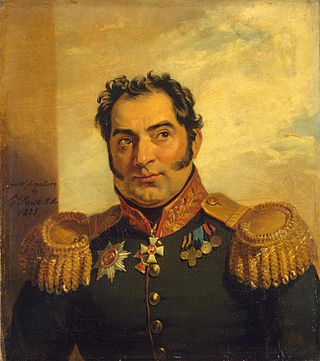
Nikolay Vasilyevich Vuich was an Imperial Russian general who fought in the Russo-Swedish War, Russo Turkish War, the Polish campaign and the Napoleonic Wars. He distinguished himself in all the wars in defense of Imperial Russia and contributed his mite in the success of the Coalition forces against Napoleon. His portrait now hangs at the 1812 Military Gallery of the Winter Palace.
Ivan Fedorovich Yankovich de Mirievo was an Imperial Russian soldier who saw service in the Napoleonic Wars.













